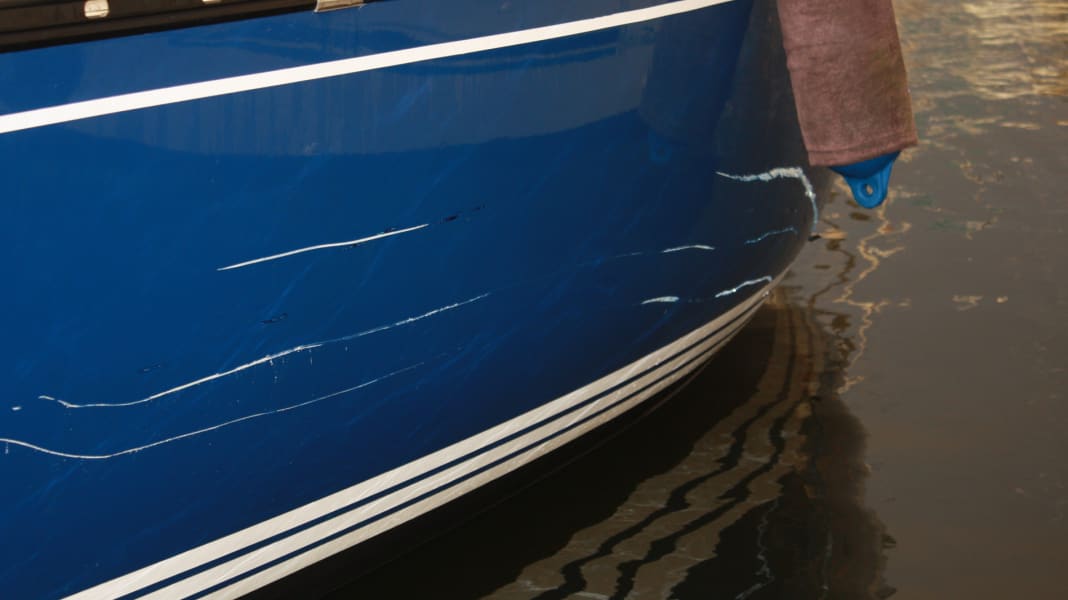Insurance: What are boat liability and hull insurance actually good for?
Pantaenius Yachtversicherungen
· 07.02.2024

- The party responsible for the damage cannot always be held accountable
- The following applies: no culpable behaviour, no compensation for damages
- Not every owner has boat liability insurance. Culpably caused damage could mean financial ruin
- Not all insurance is the same. Pay attention to the small print
From now on, we will be addressing the most frequently asked questions - and misunderstandings - about yacht insurance. In the first instalment, with the help of Dirk Hilcken from the leading boat insurance broker Pantaenius yacht insurance the basic sense and purpose of a liability and hull policy for the ship.
Quite a few owners consider themselves to be solid to good skippers who are always in control of their yacht. And if you do get a scratch on your boat, you do the repairs yourself or pay for them out of your own pocket. If someone else hits your boat, they have to pay for the damage. Insurance is therefore superfluous, isn't it?
Dirk Hilcken explains:
Caution! The principle of fault-based liability generally applies in water sports. This means that skippers are only liable for damage that they have culpably caused. For example, through wilful intent or negligence.
This regulation is in contrast to so-called strict liability, as applied in road traffic. There, vehicle owners are generally liable for damage that they cause to third parties with their vehicle, even without culpable behaviour. Although many people derive their thoughts on insurance cover from everyday knowledge about cars, it should be noted that this principle of strict liability is the exception.
The party responsible for the damage cannot always be held accountable
Storm damage is a good example to illustrate the principle of fault-based liability. If, for example, a properly moored boat breaks free during an unexpectedly violent storm and damages one or more neighbouring moorings, the owner is generally not liable for the damage caused. Without culpable behaviour, any boat liability insurance cannot settle the claim either. Injured parties are therefore left to bear the costs - unless they have hull insurance themselves. More on this later.
More about boat insurance:
- Contract types: What policies are available
- Charter: Pantaenius revises charter insurance offer
- Buying a used boat: You need these insurances for your boat
- Journey: Who will pay for my rescue?
Of course, other scenarios are also conceivable. For example, if a boat loses its manoeuvrability in the harbour due to a technical defect through no fault of its own and rams into another boat. Or if a fire breaks out on the boat in the boat hall and spreads from one boat to the next - as unfortunately happens time and again in the winter months. The same applies here: without culpable behaviour, there is no cover under boat liability insurance.
The following applies: no culpable behaviour, no compensation for damages
It is in the nature of things that the parties involved in such cases often know each other. Whether as neighbours or club members. The annoyance at the supposedly unwilling insurance company is correspondingly great. Even worse if an injured party files a lawsuit against the alleged perpetrator. For such cases, your own boat liability insurance includes so-called passive legal protection, which covers the costs of any necessary legal assistance. This protects you against unjustified claims for damages. However, it is doubtful whether it is enough to get a former friendship back on track.
Added to this is the lack of a general insurance obligation for boats in Germany. Even if the person causing the accident is at fault, it cannot be generally assumed that they have boat liability insurance. Of course, many clubs and some marinas require such insurance. However, it can never be said with certainty how exactly this requirement is checked.
Not every owner has boat liability insurance. Culpably caused damage could mean financial ruin
Too much theory? If we now disregard all the cases described above and assume that the person who caused the damage was firstly at fault and secondly has boat liability insurance, a final and sometimes decisive problem still arises: in contrast to high-quality hull insurance with a fixed rate and the principle of "no deductions new for old", boat liability insurance only ever settles according to the current value. In the worst-case scenario, it may not be possible to purchase a new boat of the same value, or repairs cannot be carried out as the owner would wish.
Without your own boat hull insurance, there is always the risk of not being compensated for damage caused by third parties, or only insufficiently. And having your own boat liability insurance should be a matter of course.
Incidentally, the insurance conditions can also vary greatly when choosing the right liability insurance. Of course, there are more exciting things to read about boats, but owners should definitely check some details. For example, whether the boat liability insurance fully covers claims by the crew and guests, including among themselves. Furthermore, the shared use of water sports equipment and damage to rented property should be insured and skipper liability insurance should be included. Not every liability insurance also covers claims under public law.
Not all insurance is the same. Pay attention to the small print
After the storm surge of the century in the Baltic Sea, for example, the city of Kiel issued an official order stating that all ships must be salvaged. In such a case - a claim by a third party - one might assume that liability insurance would at least cover the salvage costs. However, in this specific situation, some owners have found that their insurance company refuses to cover the costs because its terms and conditions only mention claims under private law. This is a small but important difference.
You should also ensure that you have sufficient cover for liability. In Italian waters, for example, cover of 6,450,000 euros is required for personal injury and 1,300,000 euros for property damage. In total, the liability cover should therefore amount to at least 7.75 million euros.
The expert:


